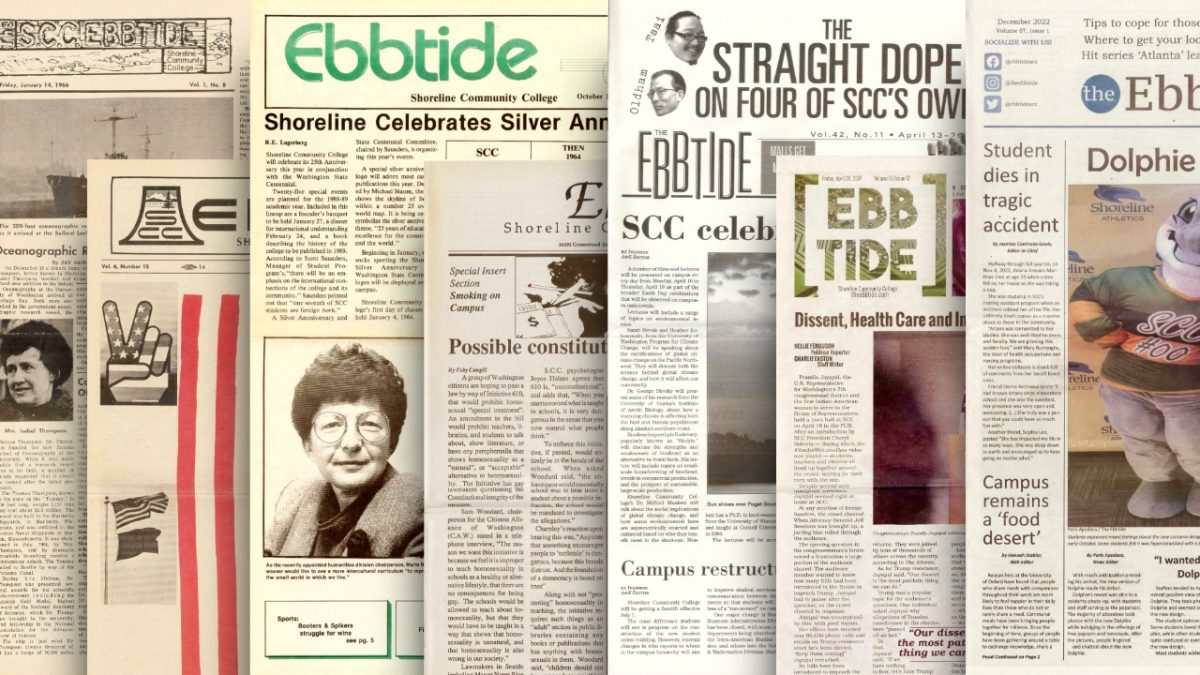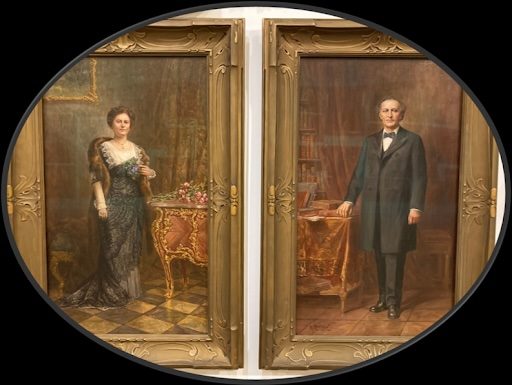GREAT ‘BEST PICTURE’ RIVALRIES THROUGHOUT HISTORY
The Oscars are largely an excuse for the industry to pat itself on the back.
Louis B. Mayer started the Academy of Motion Picture Arts and Sciences in 1927. He used the new entity to corral artists into creating the kind of movies that he thought would make his studio, Metro-Goldwyn-Mayer Studios (MGM), the most money.
“I found that the best way to handle (filmmakers) was to hang medals all over them,” he said in the Scott Eyman book “Lion of Hollywood: The Life and Legend of Louis B. Mayer.” “If I got them cups and awards, they’d kill themselves to produce what
I wanted. That’s why the Academy Award was created.”
Nevertheless, we all love motion pictures. We’re hooked, and have been since some French people first gathered in 1895 to see a train projected on a screen and, as the legend goes, subsequently freaked out when it looked like it was going to drive straight over them. Films have evolved to help shape how we think about ourselves and what we care most about.
The desire to share your thoughts and opinions about them bursts out of
you without regard for your good social standing or what grandma would think. And occasionally you feel like you own a little part of that movie, too.
Sometimes, others don’t feel the same way you do.
Debates ensue. And those debates are electric, a specific type of electricity that the industry desperately wants to bottle up and use to keep itself relevant.
And because we love them so much, despite their fraudulent origins, the Oscars remain a cultural mainstay.
The most coveted award, and the last one presented each year, goes to Best Picture. Sometimes the “right” movie clearly wins, sometimes it’s debatable. And sometimes the right movie wins, but “La La Land” gets called to the stage anyway. Have you heard of “How Green Was My Valley”? Doubtful. But in 1942, it stole Best Picture from “Citizen Kane,” which is often regarded as the greatest picture of all time.
To honor this year’s 90th Academy Awards (the official name for the Oscars), here are seven contentious rivalries in the battle for Best Picture throughout history:
1940: 12th Oscars
“Gone with the Wind” vs. “The Wizard of Oz
“Gone with the Wind” was nominated for 13 Academy Awards and won 8. It swept the competition in some of the most distinguished categories like Best Picture and Best Actress.
“Gone” touts the highest all-time domestic gross of any lm in history, when adjusted for in nation, at $1,854,769,700, according to Box Office Mojo.
“The Wizard of Oz” only took home two awards, both for its music.
But in another world, perhaps somewhere over
the rainbow, “Wizard” could have secured those prizes. Cinephiles still debate which of these films actually had the most lasting impact.
Both films were shot in color, championing the burgeoning technology of that era and were nominated for Best Cinematography. Both were directed, at least in part, by Victor Fleming. Both were backed by MGM.
These two movies highlight a major difference between two types of movies: filmed plays, harkening back to theatre roots, and the illusion of cinema. Some films, like “Gone” revolve around the characters or plot, while others, like “Wizard” are notable for their technical prowess in camera work, sound or special effects.
At its release, every film gets seen through the lens of the current climate in Hollywood. Moreover, a film also gets judged by the time period from which the viewer is looking back at the film.
“Gone” and “Wizard” are no exception. “Gone” was celebrated in an era only a few generations removed from the time it was depicting, the antebellum and post-war South, and it resonated with the values of the time.
But today, “Wizard” tops Rotten Tomatoes’ Top 100 Movies of All Time list, which speaks to its standing in popular culture.
1968: 40th Oscars
“In the Heat of the Night” vs. “Guess Who’s Coming to Dinner”
Not only did “In the Heat of the Night” win over another movie starring Sidney Poitier (“Guess Who’s Coming to Din- ner”), it also beat out future classics such as “The Gradu- ate” and “Bonnie and Clyde”.
The plot of “Heat” revolves around a Philly cop, visiting a tiny, southern town. He is falsely taken into custody and subsequently helps the bigoted sheri solve the murder. Roger Ebert, the acclaimed lm critic, wrote (“Heat”) was Poitier’s first opportunity to step down from his series of noble characters and become angry and frustrated for a change.”
Rod Steiger, the actor who portrayed the sheriff’s journey and reformation, won the Oscar for Best Actor.
Despite not earning the Oscar, the fact that Poitier played a pivotal role in two films up for Best Picture in the same year is astounding.
“Guess,” directed by Stanley Kramer, focuses on a newly engaged interracial couple and how both sets of parents process the news of their engagement.
Spencer Tracy, who plays the white daughter’s father, nails a performance wrought with personal turmoil. He was ill at the time and died 17 days after filming wrapped.
Both pictures are of an era: the ‘60s and ‘70s were full of great movies in the classic theatrical style.
1995: 67th Oscars
“Forrest Gump” vs. “Pulp Fiction”
Ever since the Academy made the decision to elect “Forrest Gump” the next
big thing, “Pulp Fiction” continues to look like it would have been the better choice.
One film destroyed at the box office, one was an indie flick by then little-known director Quentin Tarantino. Going into the night, “Gump” had 13 nominations compared to “Pulp’s” seven. “Gump” won six awards, including for Best Picture,
Director (Robert Zemeckis) and Actor (Tom Hanks). “Pulp” only won for Best Original Screenplay.
The Academy awarded “Gump” the Best Visual Effects award for its use of computer-generated imagery (CGI) to place Hanks into stock footage of real life events from television.
Told in an non-linear, gritty style, “Pulp” features standout performances by Samuel L. Jackson and Tim Roth, and revived the career of John Travolta.
Both films deal with scope in very different ways. “Gump” is grand and expansive, telling a story that weaves in and out of popular culture of the mid- to-late twentieth century, whereas “Pulp” is small and contained, showing a unique version of the world where taking somebody else’s wife on a date is standard and gangsters speak in Bible verses.
The perception of these two films changed over time: “Pulp” went from being a standout indie movie to being counted as of the best indies ever, while “Gump” went from one of the greatest things since sliced bread to just another great movie. “Pulp” clearly has an enduring legacy that went on to help shape a new generation of filmmakers. That is, if they ever got past watching the scene with the gimp.
1998: 70th Oscars
“Titanic” vs. “Good Will Hunting”
Another rivalry that has vast differences in scope in a similar way was between “Titanic” and “Good Will Hunting.” Not only that, but these two vastly differed in box office success.
According to 20th Century Fox Chairman Peter Chernin, director James Cameron
first pitched “Titanic” with a single sentence: “Romeo and Juliet on a boat.” Despite
this brevity, “Titanic” took on larger themes like how class differences ultimately affected the experiences and survival rate of each character.
Leonardo DiCaprio showed us that he was no longer just the transient teen from “Growing Pains.” This movie vaulted him to movie-stardom at the peak of America’s ‘90s monoculture, ascending to a level on par with Shania Twain and Will Smith.
“Titanic” picked up 11 Oscars, which is tied for the most of all time.
On the other hand, “Hunting” achieved greatness through persistence and attention to detail. Writers Ben Affleck and Matt Damon spent years shopping the script around to various studios before finally getting it made (by Harvey Weinstein), and it is the finer points of the characters’ relationships to one another and the
little details of authentic Bostonians that make the movie memorable.
Specifically, Robin Williams playing a wisened therapist evoked cheering and tearing in droves. He took home the Oscar for Best Supporting Actor, while Affleck and Damon won for Best Original Screenplay.
2006: 78th Oscars
“Crash” vs. “Brokeback Mountain”
With eight nominations, Ang Lee’s “Brokeback Mountain” led the pack going into
the ceremony. Lee won for Best Director, and the film picked up two more awards, including Best Adapted Screenplay, which had been based on Annie Proulx’s short story of the same name. “Brokeback” is the story of two cowboys falling in love while on duty in Wyoming.
But the big winner of the evening was “Crash”, which took home Best Picture and also won for its Original Screenplay.
Over the decades, “Crash” has been maligned for the simplicity of its portrayal of ethnic and racial stereotypes.
“Was it the best film of the year? I don’t think so,” said its director Paul Haggis in an interview a decade after the movie’s release.
However, Ebert gave it four out of four stars, praising director and co-writer Haggis for “(writing) with such directness and such a good ear for everyday speech that the characters seem real and plausible after only a few words.”
Since “Crash’s” victory, moviegoers have levied accusations that Academy members were unwilling to vote for “Brokeback” due to their own homophobia.
2008: 80th Oscars
“No Country for Old Men” vs. “There Will Be Blood”
In what was truly a great year for cinema, the top two movies were “No Country for Old Men,” directed by the Coen brothers and “There Will Be Blood,” starring Daniel Day-Lewis and directed by P.T. Anderson.
Day-Lewis bagged Best Actor but “Country” captured the top prize. Both directing units had been known for beloved works over the previous decade, the Coens for such lms as “Fargo and “The Big Lebowski,” and Anderson for “Magnolia” and “Boogie Nights.”
Both movies revolve heavily around dialogue and resolute men and were released a month and a half apart. The difference: “Country’s” lead, Llewelyn (played by Josh Brolin), is complemented by actors such as Tommy-Lee Jones and Javier Bardem.
Although Paul Dano brings a plaintive energy to his performance as deranged pastor in the small town of Little Boston, Calif., Day- Lewis steals the show in “Blood,” and he should — the story, based o the Upton Sinclair novel “Oil!”, gives its megalomaniacal main character all of the material good actors cherish.
Both “Blood” and “Country” continue to be lauded as giants of this century by masses and critics alike.
The online critic aggregator Metacritic scored them 93 and 91 respectively.












